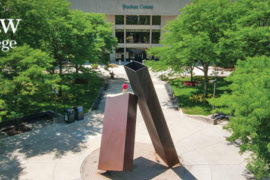Michigan’s first electric school buses will be showcased Thursday, Sept. 12, in Lansing under a program that supports cleaner air, alternative fuel options, and a safer environment for children.
Seven Michigan school districts are slated to receive 17 electric buses under a diesel bus replacement project financed in part by a Volkswagen Mitigation Settlement allocation through the Michigan Department of Environment, Great Lakes, and Energy’s Fuel Transformation Program.
A bus that will be part of the project will be at the Capitol for demonstration rides at the rollout event at 11:30 a.m. Sept. 12 on the East Lawn of the Capitol Building in Lansing. Gov. Gretchen Whitmer will be among those attending the event, along with EGLE Director Liesl Clark; school district and utility representatives; lawmakers; and Eric Marquis, Quebec’s assistant deputy minister of International Affairs and Francophonie.
With the support of EGLE’s Materials Management Division, the Michigan Association for Pupil Transportation developed the project and convened stakeholders who worked collaboratively toward a healthier environment for years to come, for children and communities. Zeeland Public Schools is the project manager for the Fuel Transformation Program grant, and the electric buses will operate in Zeeland, Ann Arbor, Gaylord, Kalamazoo, Oxford, Roseville, and Three Rivers.
With electric school buses, children’s exposure to harmful diesel exhaust fumes and particles drops to zero. In addition, no fumes from buses idling near opening and closing doors are drawn inside the school building, where children spend most of their day. Diesel emissions from older buses are not only immediately harmful to Michigan’s children, but also impact climate and contribute to long term damage to the environment.
Contaminants from diesel exhaust includes more than 40 substances listed by the U.S. Environmental Protection Agency as either hazardous air pollutants or criteria pollutants (or precursors to criteria pollutants, such as nitric oxide and nitrogen dioxide, both components of oxides of nitrogen). Both hazardous air pollutants and criteria pollutants have known adverse health impacts on humans.
Funding for the Fuel Transformation Program comes from Michigan’s allocation from a nationwide settlement after Volkswagen was fined for installing emission control defeat devices on many of its diesel vehicles.
Upcoming grants from the Fuel Transformation Program will include reimbursements to replace older diesel vehicles and equipment, including:
- School buses (with propane, clean diesel or hybrid models).
- Local freight vehicles: medium and large trucks and port drayage trucks.
- Shuttle and transit buses.
- Freight switchers.
- Airport ground support equipment.
- Ferries and tugs.
- Marine shore power.
- Port cargo handling equipment and forklifts.
- Light duty zero emission supply equipment.
The Fuel Transformation Program provides grant resources and technical support to businesses and communities. Sustainable Development Goals highlighted in the Electric School Bus project are:
- Good health and wellbeing.
- Affordable and clean energy.
- Economic growth.
- Sustainable cities and communities.
- Responsible consumption and production.
- Climate action.
- Partnerships.
To stay up to date on other EGLE news, follow Michigan.gov/MIEnvironment











